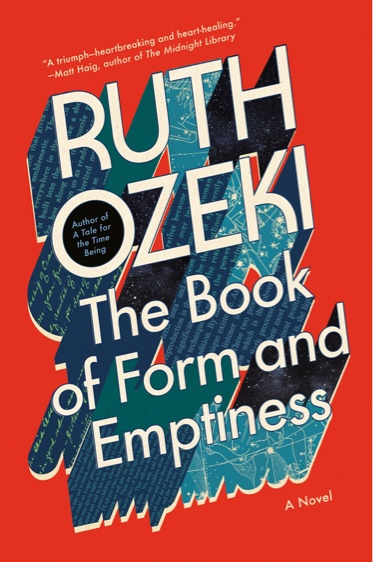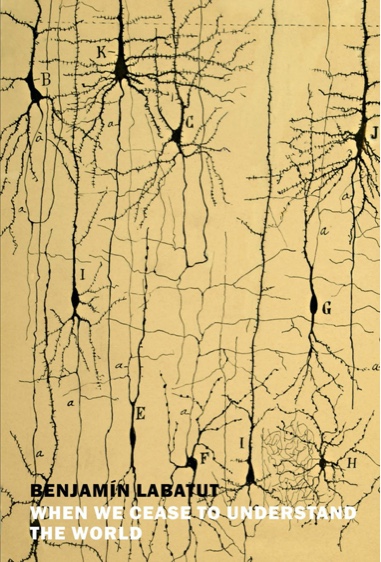-
March 16, 2022
Opening Round
-
Ruth Ozeki
2The Book of Form and Emptiness
v.
3When We Cease to Understand the WorldBenjamín Labatut
-
Judged by
Blair McClendon
The promise of globalization went something like this: Everything would be interconnected by computers (also cheap airfare and standardized shipping containers) and because of this and a great deal of techno-capitalist faith the problems of the world would fall away. This didn’t work out. We have discovered just how connected everything is though. Slogans are translated and reused, viruses spread along economic lifelines, a gas belches out of a refinery and half a world away a little more of the coast is reclaimed by the sea.
The two books I was tasked with reading both take it as a given that if you sit still and start connecting, all the dots might drive you crazy. Benjamín Labatut’s When We Cease to Understand the World and Ruth Ozeki’s The Book of Form and Emptiness, though quite different in page count, have a similar sense of intellectual sprawl. The world has been in a crisis and when a teenager or a European mathematician starts investigating the root causes they find how much of the world resists being known at all.
Grace Paley said that plot is nothing but time: “One thing happens, then another thing happens.” When We Cease to Understand the World, which seemed to be clearly under the spell of W.G. Sebald in every way except that people spend less time walking, conceives of plot in the same way. One thing happens—a chemist helps turn Prussian blue into a pesticide—and then another thing—he dies an outcast for his role in World War I’s chemical warfare and his invention is later used to murder his family and millions more. The novel collects a series of fictionalized stories of real scientists (Werner Heisenberg, Alexander Grothendieck, and Fritz Haber among them) who zealously plunged forth into the unknown and returned bearing the instruments of war, often not even realizing that that is what they had done. The prose, as translated by Adrian Nathan West, is really where the influence of Sebald is clear. It is fluid and observational, carrying within it a foreboding sense of catastrophe. One protagonist, having forsaken the world, “purchased a dilapidated hearse to get around, and, when the engine failed, he bought a second, even ricketier automobile with holes in the floorboard that opened onto the road, and drove it at the highest possible speed, though he had neither license nor registration.” It makes for propulsive reading in the same way that Greek tragedies make for good theater even though, or maybe especially because, you know what’s going to happen. The characters in this novel repeatedly lose sight of society in a monomaniacal drive to grasp the ungraspable. That way madness lies.
In The Book of Form and Emptiness a kid named Benny’s dad dies a peculiar death. He, a musician, was too high one night and decided to lie down in the street. A truck driver, thinking him nothing other than a bump in the road, did not stop and ran over him. From then on Benny’s life becomes unstuck from reality as many of us might know it. He starts hearing the voices of objects around him, which is compounded by the fact that in the wake of her loss, his mother develops a hoarding habit. Eventually she starts reading Tidy Magic (a self-help Zen manual), wherein the author writes “Doing connects me to this moment, this weed, this patch of moss…I am not separate from this moment, or from the floorboards, or the trees, or the monks, or the weed…Cleaning is a practice of compassion. Weeding is a practice of faith.”
Bright and warm, the covers of these Memo Books are heavily debossed with graphic patterns based on flowers that are among the very first to appear each spring, and then stamped with three luscious, reflective foils. The dot-graph insides are made from a superb paper from Strathmore.
Available now in 3-Packs and as part of a year-long subscription.
Benny, having made the mistake of telling others about the voices, is thought to be suffering auditory hallucinations and so winds up in a psychiatric facility. There, with the help of a friend/guide/fellow patient he comes to better understand that he is not the one who is losing touch with reality. The world is on the brink of ecological collapse and he seems to be the only one that knows he is not separate from floorboards, trees, anything with a voice, which of course doesn’t require a mouth. The book tries to take in just about everything. It is effusive, maximalist, so much so that the book itself becomes a character in the book. Benny argues with its mode of narration, reminding the reader that the characters aren’t really knowable.
Both books are concerned with a rather terrifying prospect: the impossibility of apprehension. There is always something shimmering at the edge of our perception. A brilliant mathematician sees a black sun rising over Germany and, of course, we now know what it is that will cast so much heat and shadow, but he does not. The Book of Form and Emptiness is the more heartwarming novel. The same connectivity that is leading to general disarray is also the source of a comforting sense of order. When We Cease to Understand the World is more disturbing. Here, it is the search for order that leads to our undoing.
When We Cease to Understand the World is still the one that best rooted itself in my brain. While the two novels both want to reach the edges of fiction, The Book of Form and Emptiness spends more time reminding you of that fact. It choked up the flow of reading, but didn’t provoke many other thoughts about the uses of fiction. When We Cease to Understand the World is more slippery. It recounts verifiable historical facts, but slips into dreams or causal links that are really unknowable. Neither book takes on a hectoring tone, and I would believe that both began by asking “can’t you all see what’s going on?” Denialism is very popular right now, but responding with a blanket belief in “science” operates at a strange level of abstraction. Scientists are not automatons practicing a method, they are people subject to the passions and politics of their time. “Knowledge is power,” an old German philosophy professor once told my class, “Knowledge is power over something.” A book like When We Cease to Understand the World might as well have begun in the back of that lecture hall.
When We Cease to Understand the World finishes with a quiet, disturbing conversation about forms of decay in the plant kingdom. Riotous growth precedes death. Abundance, it turns out, kills. I see how these preceding sentences might lead you to glance around the world and say no, I don’t need to be reminded that there is no easy way out. I think that would be a reasonable response. Times are hard. The Book of Form and Emptiness ends on a lighter note as Benny’s mother’s archives are hauled away by a garbage truck. Even as she loses the archives, she regains her son, who has returned home after an odyssey of sorts. A moment that could read as devastating is turned into an affirmation of the power of stories and familial bonds. But I’m not sure I actually like being made to feel better. This is surely a fault of my own stubbornness and, over the last few years, maybe evidence of some kind of perversity. But what would we be without our perversions? What else drives us out beyond what we already know?
Match Commentary
By Kevin Guilfoile & John Warner
John Warner (he/him): Every Tournament we have a few matchups where the juxtaposition of titles in the hands of a perceptive judge reveals aspects of the books I did not, and would never have considered on my own, and Judge McClendon really delivers the goods on that front here.
The connections he draws out really made me feel more warmly toward The Book of Form and Emptiness, which was perhaps the title I was most anticipating reading because of my enduring Ruth Ozeki stan-dom. Strangely, even though dire stuff was happening, the book felt somewhat weightless to me, almost as if the pull toward what Judge McClendon describes as a “heartwarming” effect was driving the choices. It began to feel a bit coy, which I was surprised by.
On the other hand, When We Cease to Understand the World simply surprised me because I entered it totally ignorant as to its subject matter, intents, critical reception, anything. That’s pretty rare for me these days, and it was great. It really got under my skin in interesting ways.
Kevin Guilfoile (he/him): I liked When We Cease to Understand the World. That is a true statement. But I also had a lot of ambivalence about it. Much of it doesn’t read like a novel at all. Much of it feels like a Malcolm Gladwell book or something, a series of true stories that will eventually be connected in fascinating ways. As the book progresses, however, Labatut starts making more and more stuff up. It is always compelling, but I’m not sure that I always approved of that feeling of being unmoored from both fact and fiction. It must be OK on some level because I enjoyed it, but I’m not 100 percent certain how I felt about it. And maybe that’s OK, too. Maybe as a piece of entertainment, and also as a creative/intellectual exercise, it’s a success.
John: I started the book on a plane, which was a good thing because it prevented me from pausing to look up how much of what I was being told was verifiable to known facts, and how much was invented. I have no doubt I would’ve been Googling furiously if my phone hadn’t been in airplane mode. It’s interesting how quick this impulse kicked in for me, how hard it would have been to resist.
Cut off from any outside information or confirmation, I was forced to go with the conceit that biographical information and any broadly described events in the book were “true,” while anything that was constructed as a scene was invented out of that true stuff. I think this is pretty close to how the book works, but to be honest, I don’t know that for sure because I never bothered to look it up once I finished the book because the book had delivered such a complete and satisfying experience for me.
Your Gladwell comparison is interesting because Gladwell is, famously, often full of shit. It’s not that he outright makes stuff up, but he often makes very big conclusions drawn from a very thin reed, all in the service of telling a compelling story. The problem is that Gladwellisms then become a kind of popular gospel, even though they’re usually so overbroad as to be essentially wrong.
Kevin: That’s an excellent point. Things that are untrue creeping their way into books labeled nonfiction is a far greater concern than true things populating a novel. Thinking more about it, it’s likely the fact that much of When We Cease to Understand the World is written like nonfiction (and also that I read it on my phone, which I rarely do with novels) that put me off my pins a bit. That’s not a bad thing.
As Judge McClendon even says, in reference to The Book of Form and Emptiness, “I’m not sure I actually like being made to feel better.” That sounds like a reframing of one of Walker Percy’s recurring themes: Why do we often feel good when times are bad, and bad when times are good? More than two decades after Percy’s death, that philosophical question basically became the Facebook algorithm, and birthed a nation of doom scrollers.
And, like Judge McClendon, When We Cease to Understand the World was clearly the book that got under my skin.
New 2022 Tournament of Books merch is now available at the TMN Store. As a reminder, Sustaining Members receive 50 percent off everything in our store. To find out why we’re asking for your support and how you can become a Sustaining Member, please visit our Membership page. Thank you.
Welcome to the Commentariat
Population: You
To keep our comments section as inclusive as possible for the book-loving public, please follow the guidelines below. We reserve the right to delete inappropriate or abusive comments, such as ad hominem attacks. We ban users who repeatedly post inappropriate comments.
- Criticize ideas, not people. Divisiveness can be a result of debates over things we truly care about; err on the side of being generous. Let’s talk and debate and gnash our book-chewing teeth with love and respect for the Rooster community, judges, authors, commentators, and commenters alike.
- If you’re uninterested in a line of discussion from an individual user, you can privately block them within Disqus to hide their comments (though they’ll still see your posts).
- While it’s not required, you can use the Disqus <spoiler> tag to hide book details that may spoil the reading experience for others, e.g., “<spoiler>Dumbledore dies.<spoiler>”
- We all feel passionately about fiction, but “you’re an idiot if you loved/hated this book that I hated/loved” isn't an argument—it’s just rude. Take a breath.



